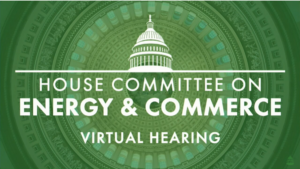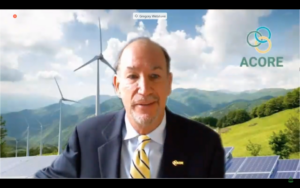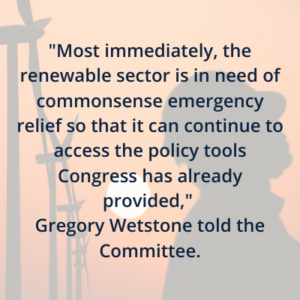ACORE CEO Greg Wetstone Testifies Before Congress, Highlights Sobering Toll of COVID-19 on Renewable Energy Jobs and Calls for Immediate Action
By: Daniel Wolf
June 25, 2020
Last week, the Energy Subcommittee of the House Committee on Energy and Commerce held a hearing entitled, “Reviving our Economy: COVID-19’s Impact on the Energy Sector.” Witnesses included Ernest Moniz, former Secretary of Energy and current Energy Futures Initiative President and CEO; Rich Powell, ClearPath Executive Director; and our own Greg Wetstone, ACORE President and CEO. The Committee’s focus on our nation’s energy sector in the midst of the COVID-19 pandemic highlights the growing bipartisan awareness of the need for immediate emergency relief for the renewable energy industry and its workforce.

Subcommittee Chairman Bobby Rush (D-IL) characterized the hearing as an opportunity to examine the widespread impacts of COVID-19 on our nation’s economy, which has hit the clean energy sector particularly hard. Chairman Rush stated, “According to recent data, this industry…has lost over 600,000 jobs since March. Further, without intervention, forecasts suggest that 1 out of every 4 clean energy workers may soon lose their jobs as a result of COVID-19. To put this into perspective, that is nearly a million hard working Americans who will be out of work.” These numbers are supported by an analysis of federal unemployment data by BW Research and released by ACORE, E2 (Environmental Entrepreneurs), and E4TheFuture the day before the hearing showing that the clean energy sector lost more than 620,000 jobs over the months of March, April, and May.

In his opening statement, full Committee Chairman Frank Pallone (D-NJ) highlighted how the pandemic has erased years of progress on clean energy and echoed Rush’s call for Congress to invest in clean energy infrastructure to put people back to work. He cited the Committee’s work on the LIFT America Act legislation intended to help rebuild America through investments in combating climate change and protecting public health and the environment. Perhaps most notably, Chairman Pallone expressed support for extending renewable energy tax credits. “While recent action by the Department of the Treasury to delay certain in-service dates has helped, the clean energy industry needs certainty and assistance,” Pallone said during his opening statement. “I believe it’s critical that any recovery package include an extension of these expiring tax credits.” This statement echoes growing calls by House Democrats to delay the phasedown schedule for existing renewable energy credits in light of COVID-19 impacts on renewable development this year.
Secretary Moniz’s testimony stressed that federal action would be required to help stem the massive job losses brought on by the pandemic, including investments through future stimulus bills and Congressional appropriations. Moniz argued for increased R&D funding to help develop the technologies and industries of tomorrow, and the importance of renewable energy leading the recovery, since decarbonizing other industries will increasingly rely on electrification in the coming decades. In response to a question from Chairman Pallone on the importance of federal assistance for the sector, the Secretary cited how direct federal investment of over $90 billion under the American Recovery and Reinvestment Act in the midst of the Great Recession helped fuel our economic recovery and create the robust clean energy sector we see today.
ClearPath’s Powell stated in his testimony that he embraced a technology-inclusive agenda, detailing four key pathways for Congress to help restart the U.S. energy economy. These included promoting innovation through a program of technology demonstrations, eliminating unnecessary regulatory hurdles that slow project development, deploying technology to prove it at scale and bring down costs, and exporting technologies to new clean energy markets.
In his testimony, ACORE’s Wetstone noted that renewable energy has made up more than half of all new U.S. power generation capacity over the past decade, and now represents 19 percent of the nation’s electricity resource mix. As one of the nation’s largest sources of private sector infrastructure investment, the renewable sector employs nearly 550,000 Americans workers in every state of the country.

Wetstone explained, however, that COVID-19 has been a game changer. Shelter-in-place requirements, supply chain disruptions, delays in permitting and inspection and construction, and a constrained tax equity market have all combined to exact a sobering toll. The analysis of data on unemployment filings undertaken by E2 and BW Research shows that nearly 100,000 renewable energy workers lost their jobs over the past three months, equating to a renewable sector unemployment rate of almost 20 percent. Wetstone’s testimony highlighted the need for commonsense emergency relief measures to stem the tide of job losses. In order to build on Treasury Secretary Mnuchin’s recent decision to provide an extra year of safe harbor continuity for 2016 and 2017 renewable projects, Wetstone called on Congress to:
- Provide temporary refundability for renewable tax credits facing an increasingly constrained tax equity market; and
- Delay the scheduled phasedown of the Production Tax Credit (PTC) and the Investment Tax Credit (ITC) in recognition of COVID-19’s nationwide impact on renewable development this year.
During Q&A, Rep. Pete Olson (R-TX) captured the growing bipartisan consensus in support of renewable power when he observed that “The past three months have been very rough here in TX-22. We’ve lost a lot of jobs, good paying jobs…10 years ago this picture back home would have been very bleak, but as Mr. Moniz stated, Texas adopted an all-of-the-above policy. We used to be just black gold, Texas tea, all oil. Now we are number one in wind production for the entire country by far…solar is growing rapidly as well…so we embrace all-of-the above in renewables.”
As renewable energy expands in every state, bipartisan political support expands with it. ACORE will continue to highlight the impact that COVID-19 is having on the renewable sector and advance policy solutions to mitigate those impacts. With the right policy support, the renewable energy sector can help drive recovery from the current economic downturn, as we did in 2009, and lead the way to an effective climate solution over the long haul.
View a recording of Greg Wetstone’s testimony here. Read his written testimony here.
Join leaders from across the clean energy sector.

What will our next 20 years look like? Here’s the truth: they’ll be better with ACORE at the forefront of energy policy.
Shannon Kellogg
Amazon Web Services (AWS)
